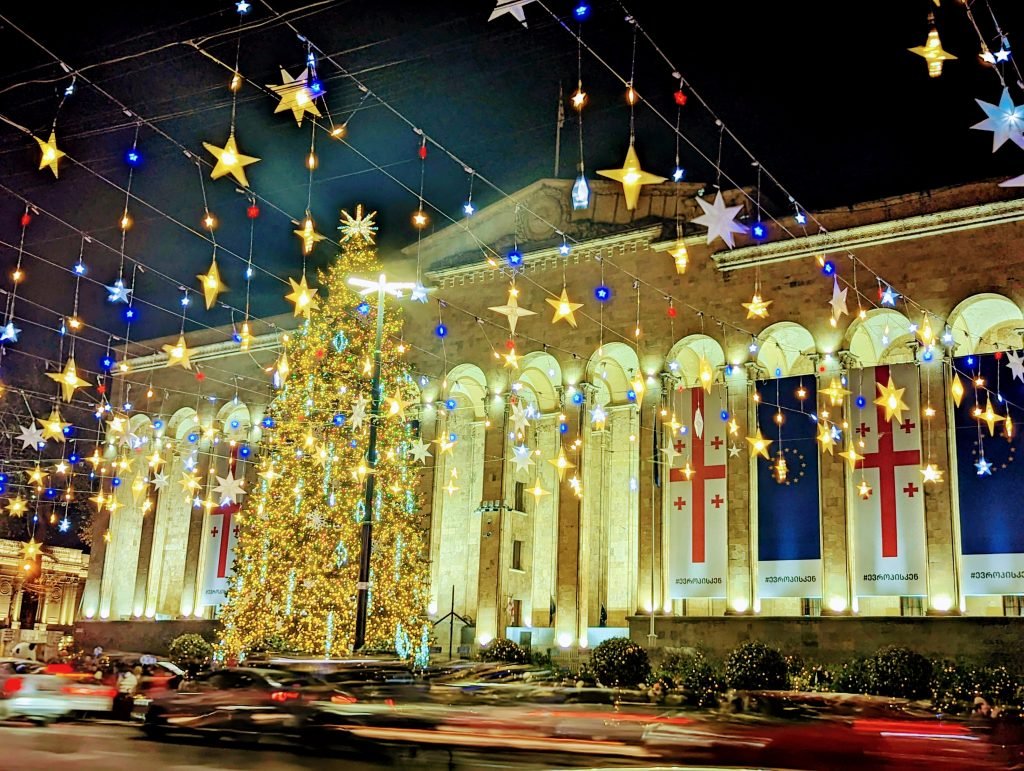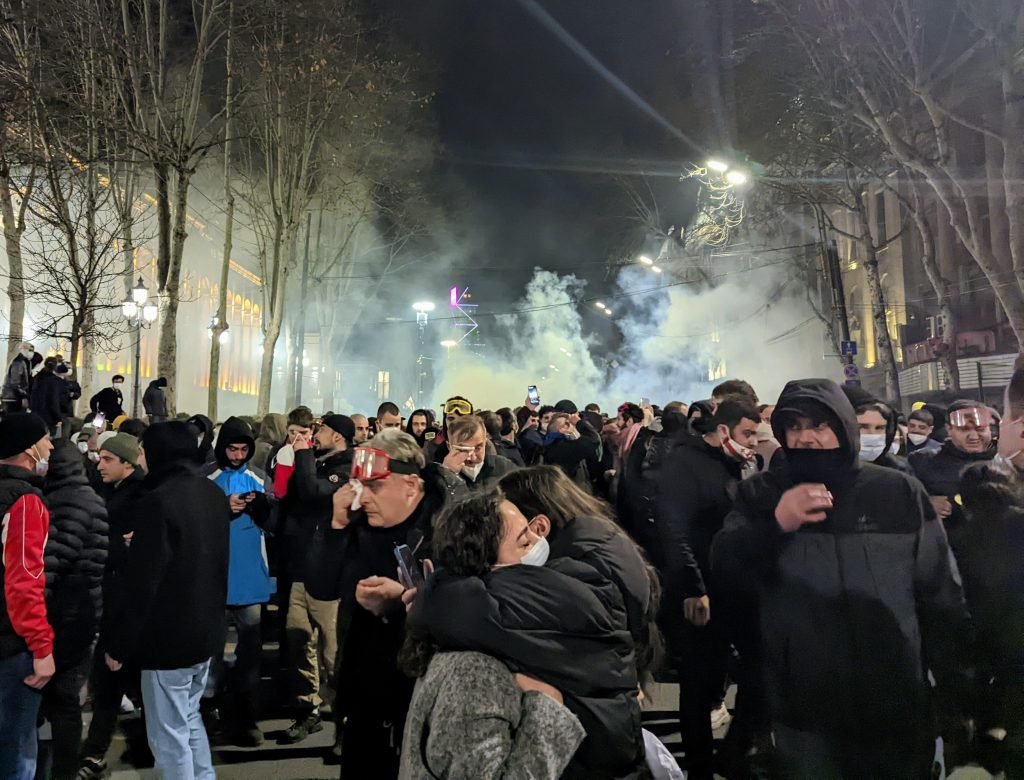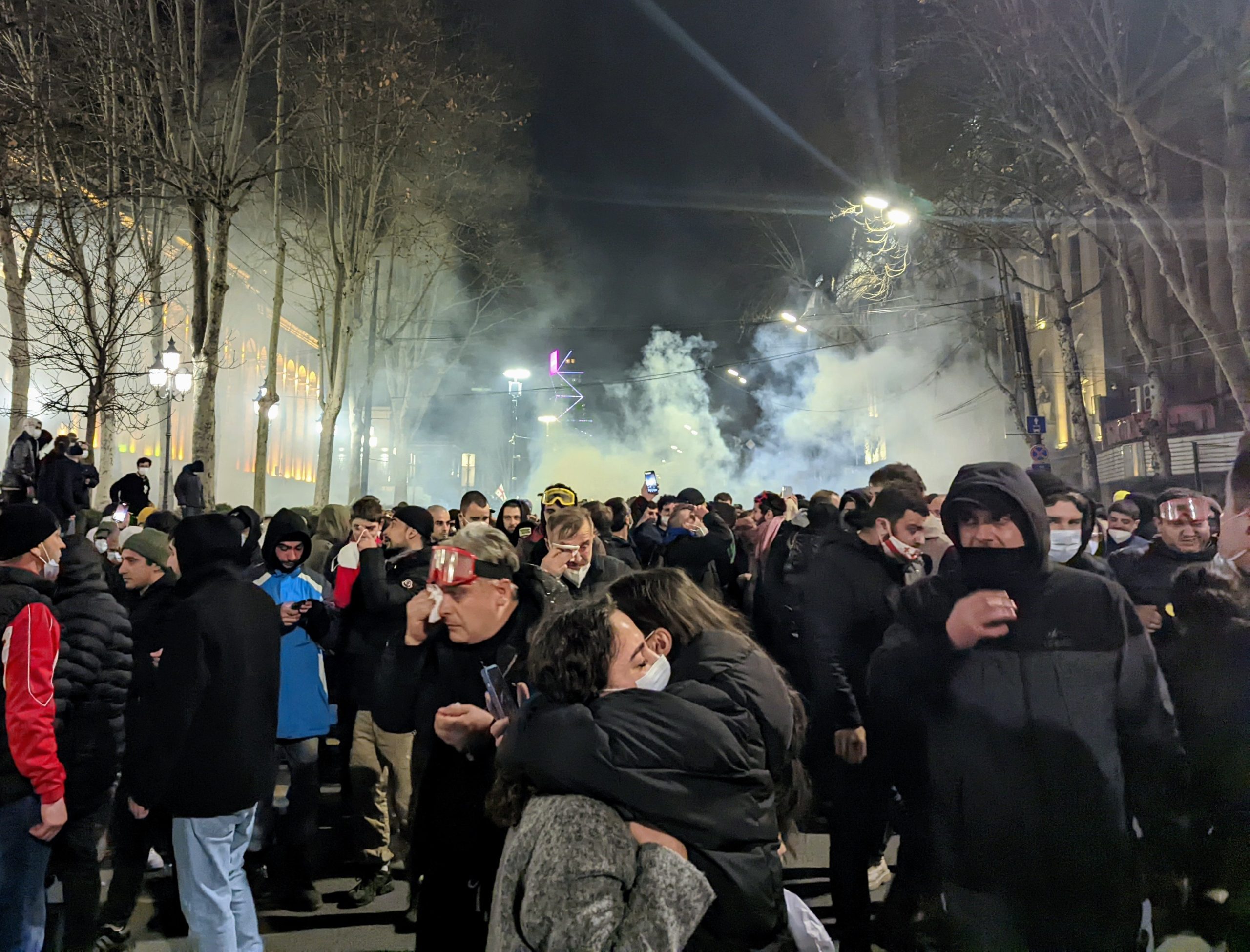Dispatch 2023 | Bracing for Chaos
To get a sense of how 2023 went in Georgia, go to Tbilisi’s central Rustaveli Avenue. The street has witnessed many highs and lows of independent Georgia and has stayed busy for the past twelve months.
Countless shining stars – all blue and gold – covering the main thoroughfare reveal the year’s happy endings. The crowds around the Parliament bring back the memories of numerous massive gatherings – in the same place, but for different reasons. The EU flags proudly displayed on the parliament building take us to times when their absence would stir controversies. Occasional startling noise from explosives and fireworks only reminds us that there used to be more of it, showing the silent change activism can bring. A giant panda figure, awkwardly trying to fit in front of the Christmas tree, hints at all foreign policy uncertainties that Georgia brings into 2024. And then, behind the Christmas tree, there is a cross. The cross, once put there by violent crowds, stands untouched to warn how destructive faith can be when it’s misused – and perhaps also how the greatest perils still lurk behind the trees.
As 2023 nears its end, Georgia says goodbye to another rollercoaster year. What started with dystopian prospects ended with a historic breakthrough. In between, however, the year offered diverse challenges – old and new, as well as lessons – learned and unlearned. All of these are here to stay and define the coming year, a year of parliamentary elections and thus of heightened turbulence.
Here is Dispatch, and Nini, to look back at the main highlights of the very memorable 2023 – and say a word or two about what to watch for in 2024.
2023 in Georgia: A Year in Review

Foreign Agent Bills: Darkness Halted
2023 had a tough start. On New Year’s Eve, People’s Power, the ruling Georgian Dream party’s hardline Siamese twin, announced plans to introduce “foreign agent” bills. Drawing on the illiberal practices of countries such as Russia, bills would label foreign-funded NGOs and media outlets as foreign agents, threatening to stifle dissent in Georgia eventually. Against all hopes, Georgian Dream endorsed it. Yet, contrary to the ruling party’s hopes to benefit from widespread polarization, the bill was met with massive resistance.
The West drew its red lines. The EU made clear that the adoption would stand in the way of Georgia’s aspired candidacy. Various segments of society united to condemn the bills as authoritarian, anti-EU, and pro-Moscow. And when, on March 8, the ruling party deceitfully passed the laws ahead of the scheduled time, the streets erupted in fierce protests. Attempts to disperse the crowds with tear gas failed to scare away the young Tbilisites. After two days of drama in and around the parliament building, the ruling party had to kill the bill. The faith in civic mobilization returned. And even if 2023 would ultimately bring significant historical events, hardly anything in years could match the March protests in their significance for Georgian democracy.
Big culmination: EU candidate status
Foreign agent bills threatened to end Georgia’s EU chances, yet ended up doing the opposite. The heroic images of Georgian activists braving water cannons with EU flags reached distant Brussels. Soon, excited Western foreign ministers would be rushing to Tbilisi to push the political elites to address reforms on which the EU conditioned Georgia’s candidacy upon the initial rejection last year. The ruling party pledged to implement reforms, but the execution was rather a facade. Still, the pressure – both local and from abroad – must have helped at least not to make things worse. Ultimately, the relentless fight of Georgians, decades of work, geopolitical factors, and the EU’s twelve stars all aligned in Georgia’s favor. In December, Georgia became the EU candidate country. History has been made, but critical reforms are still pending. Yet the positive signal is hoped to maintain public vigilance for democracy throughout the tumultuous election year.
Homecoming: GD’s conservative drift
Georgian Dream responded to its foreign agent debacle with a well-tested cure. Ruling party leaders kept bothering the God above and critics below by doubling down on their conservative rhetoric. The “traditional values” and sanctity of the church were repeatedly used to attack opponents, incite violence, deepen polarization, and enrich the ruling party’s anti-Western conspiracy theories. The new ideology also helped GD form new friendships, including with right-wing Hungarian leader Viktor Orban (who was meant to be Tbilisi’s shortcut on the EU path but ended up making things harder). The rhetoric shows no signs of subsiding, and songs of praise and worship are expected to be the main soundtracks of next year’s election campaign.

Foreign Policy: North, West, East, and Other Misunderstandings
Dangerous Liaisons: As 2023 arrived, relations between Tbilisi and its Western allies were far from ideal. Moscow’s May decision to restore direct air links and introduce visa-free travel for Georgian citizens only added fuel to the fire. The Georgian government chose to embrace Russia’s decisions and even take credit for improving the lives of Georgians through its “pragmatic” Russia policy. Soon, the first Russian planes landed on Georgian runways, upsetting the U.S., the EU, Kyiv, and local pro-Western critics at the same time. Tbilisi, however, managed to do so without getting sanctioned.
For a Few Dollars More: Pushing the West’s buttons – both in words and deeds – still came at a cost. In April, the U.S. State Department imposed travel bans on key Georgian judges alleging “significant’ corruption in the judiciary. In September, alleging links to Russian security services, the U.S. sanctioned Otar Partskhaladze, a former prosecutor and close associate of Georgia’s informal ruler Bidzina Ivanishvili. The decision led Georgia’s once-independent central bank to put the country’s financial well-being at risk by changing legislation to save Partskhaladze’s skin. Yet, no significant economic shock followed. On the other hand, Tbilisi introduced new export bans to align with Western trade sanctions against Russia, but the West has remained unhappy over the overall falling rate of Georgia’s alignment with their Russia policies.
Hidden Dragon: Just when observers worried about Georgia sitting on two chairs with Russia and the West, Tbilisi seemed to have found a third one to sit on. Following the Georgian Prime Minister’s surprise but ceremonial China visit in July, Tbilisi, and Beijing unveiled a new strategic partnership. The government claims it follows pragmatic economic interests amid rising interest in the Middle Corridor, a Russia-bypassing road linking China with the West through Georgia. Critics remain wary. Some worry that China’s appetite could be bigger than trade routes, possibly eyeing strategic takeovers such as the Anaklia port project.
O, Brother… Georgian-Ukrainian relations didn’t get any warmer. It hit another low in July when Kyiv – concerned over the health of ex-President Mikheil Saakashvili, currently a citizen of Ukraine – requested the Georgian ambassador to leave for Georgia. The rest of the year, however, was relatively scandal-free.
Occupied Regions: Stable Instabilities
Moscow-appeasing policies turned insufficient to protect Georgian citizens living in and around occupied Abkhazia and South Ossetia. Illegal detentions continued. In November, Russian forces shot and killed Tamaz Ginturi, a Georgian citizen, near the dividing line with the South Ossetia/Tskhinvali region. In December, an ethnic Georgian was beaten to death in Gali, Abkhazia, by local security forces. The year also ended with an ECHR ruling holding Russia responsible for the murder of a Georgian citizen in 2016. Sokhumi and Tskhinvali de-facto leaders suffered from their insecurities, too. Echoing Tbilisi-born “second front” conspiracies, they first worried that potential government change would result in Georgian attempts to regain the territories by force. Eventually, they’d develop an opposite fear that Tbilisi-Moscow’s rapprochement under the Georgian Dream would lead the Kremlin to return the two regions to Georgia. None of these happened so far. The fears, however, ultimately pushed Sokhumi to transfer the historic vacation complex and land parcel to Moscow against local objections.

Political Battlefield: Bracing for Chaos
Inner Demons: With months until the next parliamentary elections, the opposition is in disarray. Polls haven’t been favoring their chances. The United National Movement, the strongest opposition party, is ending the year just like the last one: with internal power struggles. Their jailed spiritual leader, Mikheil Saakashvili, has tried to save their chances while battling his worsened health in the hospital – but has enjoyed less spotlight overall. Smaller parties keep frantically looking for allies to make it through the five percent threshold (which the ruling party refuses to lower) as Georgia is to hold its first proportional elections. As we enter 2024, most of the contours of the following year’s campaign battlefield are yet to be drawn.
A Christmas Gift: A Georgian male politician loves nothing more than making holidays about himself. Just as we thought we were done summing up the year’s highlights and ready to greet 2024, privacy-loving ruling party patron Bidzina Ivanishvili announced his yet another comeback to politics – as he claims to protect the government “of human temptation” by excessive power, but more practically – to lead his party through another election. Some of us might blame it on the current influence of Mercury Retrograde, an astrological phase notorious for bringing back toxic exes. But those who prefer a more scientific approach can easily remember – he never really left.
A Star is Born: President Salome Zurabishvili’s unlikely transformation from the most hated to the most admired politician has been completed in 2023. Her decision to pardon jailed media boss Nika Gvaramia, followed by repeated rebellions against the government, propelled her into peak popularity. That fame was further boosted by the ruling party’s symbolic but failed attempt to impeach her. With her tenure ending next year, she’s the biggest intrigue for the 2024 general elections.
Human Rights (and Wrongs)
Blank Space: Despite the defeat of the foreign agent bill, protecting human rights and liberties has remained a big concern. The murky case of Lazare Grigoriadis, a young man jailed and currently tried for allegedly throwing a petrol bomb at a police officer during March protests, keeps attracting public scrutiny. Grievances continued over persisting gender-based violence, including forced marriages and cases of femicide. School personnel have complained over political pressure and politically motivated appointments and dismissals, with the trend expected to intensify amid approaching elections. The government has also been accused of a growing crackdown on freedom of expression. Activists were detained for holding slightly offensive or even blank banners, and rules for setting up tents – a popular protest form in Georgia – have been tightened.
Under His Eye: The most significant threat again came from untamed and seemingly government-condoned far-right violence. Throughout the year, government critics, journalists, and politicians suffered similar attacks believed to have been incited or even organized by the ruling party. The violent trend peaked in July when ultra-conservative crowds were allowed to disrupt an LGBTQ pride fest – despite the police pledges to protect the event. Such groups and unpunished violence may remain the key weapon in the government’s hands to intimidate critics in the coming year.
Cultural Revolution: Boycotts swept the Georgian culture field throughout 2023. The rift between hardline Culture Minister Tea Tsulukiani and art workers only widened this year. The scandals included dismantling, politicization, and controversial appointments of loyalists in Ministry-subordinated public bodies – including Writers’ House and National Film Center. The controversy later moved to the corridors of the security services: several artists were summoned for questioning after attending a routine training on non-violent resistance, which authorities claimed to be a part of a bigger coup plot.

Economy: In the middle of everywhere
Number 1 Concern: Georgia’s economy has remained the top public concern. Despite sanctions-related controversies, the trends remained stable. According to TBC Capital, a Georgian economy think-tank, “2023 has been a year of normalization of major macroeconomic trends.” Compared to two years of double-digit boom, the GDP growth has fallen to around 7 percent in 2023. Inflation also moderated, but life remained expensive due to the negative trends of the past few years. The government tried to combat soaring prices by intervening in the pricing policies of retail and pharmaceutical businesses. Authorities also expanded the funding of treatment for certain diseases while advocacy to introduce free school meals continued without result.
Migration Migraines: Skyrocketing prices, particularly in housing, have often been blamed on last year’s Russian influx. The first reports now show that the same high prices are massively driving the migrants out of the country. We are yet to see how many will leave and whether they take high prices or the economic boom – for which they are also partly responsible – with them. On the reverse side, seeking work opportunities abroad has remained a popular choice for Georgians, leaving the country struggling with a strange combination of unemployment and labor shortages.
Great Expectations: The country’s function as a key stop in the Middle Corridor connecting East with West kept attracting interest and ideas. The construction of the last sections of the international East-West highway is nearing its finish. The government claims it remains committed to the controversial Anaklia deep sea port project and stated its plans to build a bigger airport near Tbilisi to become an aviation hub.
Health and Labor: With the high cost of living, labor actions kept drawing attention, anywhere from the small miners’ towns to Tbilisi’s gig economy. Labor groups advocated for a still-absent minimal wage. The government did introduce minimal hourly wages for medical workers to help one of the most underpaid groups, but the problem remains as the pay is still low, and salary payments are regularly delayed for months. Surrogacy -once a thriving business in Georgia – was banned for foreigners, with authorities citing women’s and children’s rights, EU regulations, and fears of children ending up with same-sex couples.
Natural and other disasters
Unkind reminders: Natural disasters rocked the world this summer, and Georgia was no exception. But this time, the climate change-induced doom came in scales unseen and unfathomable before. In August, a massive glacial mudslide buried the entire Shovi resort in Racha, western Georgia, killing dozens – including entire families. In weeks that followed, floods wreaked havoc on other parts of Georgia as well, and the country was also hit by debilitating heatwaves. The disasters left the country in shock and raised questions about the government’s preparedness and ability to handle emergencies. Big infrastructure projects now increasingly face public and media scrutiny. Yet, despite learning the lessons the hard way, greater debates on climate change’s broader economic and social impacts are still pending.
Run, Forest, Run: Along with the effects of disaster, locals in Racha had to fight on other fronts as well. Reports that David Khidasheli, a hugely controversial Moscow-and-Ivanishvili-connected businessman, was granted a 49-year hunting license over a large (over 100,000 ha) forest territory in Racha fueled lengthy protests. Either that resistance turned out successful, or the businessman had a change of heart, but the environmental authorities had to annul the deal. Lessons, however, were still left unlearned, and Tbilisi, among others, entered the new year rowing with developers and fuming at newly authorized gargantuan projects.

“Did You Die, Though?”
For Georgia, 2023 has unquestionably been a year of great achievements. And, considering the state that the rest of the world currently finds itself in, one could say Georgia survived another year without massive damage. This, however, in no way means that things went smoothly. The biggest battles were won with blood, sweat, and tears. Losses were suffered. Georgians enter the 2024 election year with a mix of fatigue and neurotic excitement, again hoping for the best but expecting the worst. Many remain vigilant and ready to give their best for a better future. And where vigilance won’t be enough, we will again hope for miracles to make up for missing efforts.
Thank you for staying with Civil.ge and Dispatch through another stormy year, and we look forward to having you among our readers in months and years to come! Season’s greetings!
